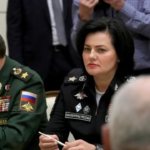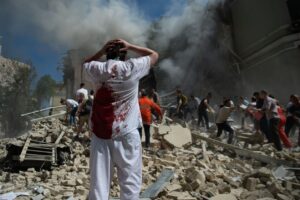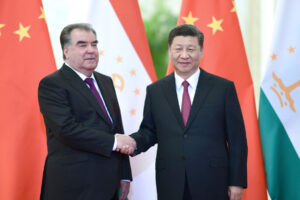On the steps of the journalists’ union in Downtown Cairo last Thursday evening, a woman held up a poster that showed eight babies: four parcelled up into small, green packages, four in just their nappies. Dead, all dead. The woman next to her held her own precious baby tight and jumped and stamped as we called out: “Open up the Rafah border!” There were maybe 100 of us.
A hundred people sounds like nothing compared with the multiples of thousands marching in cities across the world. But in Egypt, protests were outlawed in November 2013; 57 people who took part in protests after 7 October are currently in detention pending investigation. Everyone on the steps was demonstrating for Gaza and at the same time making a claim for the right to protest, their chants amplifying what you constantly hear in homes and on streets.
The sentiment in the country is strong. TikTok and Instagram videos from Gaza go viral: a woman looking for a “fair little boy with curly hair”; a grandfather holding the rigid body of a little girl; a red triangle hovering on the screen to direct your eye to a targeted Israeli Merkava tank about to explode; smiling kids making V-signs in the rubble. Uber drivers turn off their meters for Palestinian passengers. Despite crippling economic conditions, donations flood into private centres hastily set up to receive them. A call for accommodation for three families who managed to get to Cairo was answered in minutes.
But all this civil solidarity can only address the humanitarian side of Palestinian suffering. The political conditions that give rise to it can only be addressed by states and international organisations.
For 16 years we have been smarting with guilt at Egypt’s complicity. For 16 years Egypt has operated the border crossing at Rafah in alignment with Israeli policy. The chants on the steps ask: “This side Egypt, that side Palestine / But who holds the crossing key?” And again: “Egypt is a sovereign state / And this is a war of genocide!” They appeal: “Say to the zombies that rule over us: / You are making us die of shame!” They state: “The bombs are American / The treachery is Arab!”
In 2000, after two decades under the soporific rule of Hosni Mubarak, it was Palestine’s second intifada that reignited the Egyptian urge towards freedom and democracy and started putting protests on the streets. That fuse took a decade to explode in the 2011 revolution (AKA the Arab spring). I wrote at the time: “In every Arab country where the people rise up to demand their rights, they demand action on Palestinian rights as well.” The people know that Palestinian rights are inseparable from rights in the rest of the Arab world. Now, with the revolution defeated and more than 60,000 political prisoners in Egyptian jails, here comes another Palestinian revolt to inform a new generation and trouble those in power.
Actually, for probably the first time in 12 years, the people of Egypt and its government seem to be in agreement: no displacing the Palestinians, adequate aid allowed into Gaza and an end to Israeli bombing. But beyond that, the people want the complete lifting of the siege, for Rafah to be a “soft” border between friends.
Much pain is located in Rafah, the town sliced in half in the 1979 peace deal that returned Sinai from Israel to Egypt; families in Rafah were separated by barbed wire, and fields and orchards were bulldozed to create a border. Now, even though it is controlled by an official terminal building, the constant impulse from both sides is to breach it and heal the rupture: “Between us and our families there’s a crossing / Why should the Zionists control us crossing?”
No one here is surprised at Israel’s war. The surprise is how readily the US and Europe have fallen into lockstep with it – and how they stay the course as casualties rise and cities fall. The reaction here has made “boycott” a household word. People need to do something – and boycotting is something everyone can do. On Facebook groups, in shops and malls, people are looking for local alternatives to what they used to buy.
What the global south has known for 100 years, the people of the global north are understanding now: that Zionists want all the land, with none of the Palestinian people, and will stop at nothing to get it. People are realising that their democratically elected governments have for decades been aiding and abetting Israel in the dispossession of the Palestinians, while their media has smokescreened it. What does that tell them about their systems and the values they profess?
In this time of grave danger, when old and young are mobilising for the climate against powerful interests, when rightwing governments are taking power, when the left is betraying the values of the left – if Israel shows that there are no consequences to apartheid, genocide and forced displacement, how can anyone feel safe? It seems that now, at last, people are realising that Palestinian rights are inseparable from the rights of the whole world.
The activists of the Egyptian journalists’ union have called for an international convoy, the Conscience of the World, to meet in Cairo and travel the 230 miles to Rafah. Hundreds have responded. But so far it’s not certain that the convoy will be allowed to leave Cairo. The Egyptian government arrests its citizens for protesting for a cause it endorses. Can it tolerate citizens of other countries joining them, on the ground, to press for that cause? On the steps of the union, a banner reads: “Do not block the Conscience of the World!”
Source: The Guardian
















